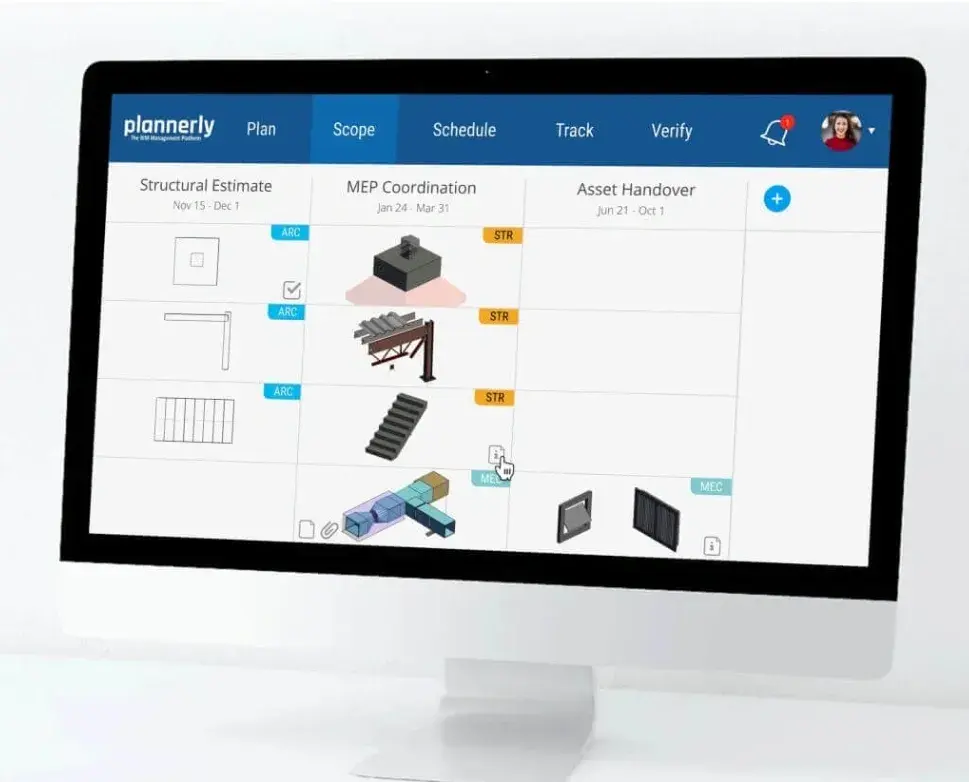BIM Civil Courses to Advance Your Career in 2024: From Beginner to Expert

Table of Contents
Civil engineering plays a pivotal role in shaping the modern world. It is responsible for evaluating designs, construction processes, and maintenance of infrastructure and building projects. Civil engineers ensure precise on-site execution, monitor material procurement, and take care of site safety. To simplify these responsibilities, it has become essential for civil engineers to adapt and upskill in new technologies like Building Information Modeling (BIM).
BIM has brought about a major change in the industry for the better, offering capabilities in project visualisation, coordination, and management. Today, mastering BIM is not just an advantage but a crucial aspect of project efficiency, accuracy, and long-term viability. Companies are on the lookout for BIM-efficient civil engineers who can harness the full potential of this technology.
What is BIM for Civil Engineers?
Traditionally, when civil engineers worked on a construction site, they would create 2D drawings that were prone to errors and begin executing them. BIM has simplified this process by assisting them in creating a 3D representation of the infrastructure in a virtual environment. This allows them to evaluate the material requirements and estimate costs. The 3D models also help them strategise, design, and a project. BIM tools help civil engineers to collaborate, integrate, and execute designs like never before.
Importance of BIM for Civil Engineers

BIM has become indispensable for its multifaceted and substantial role in modern civil engineering. BIM tools like Revit, Navisworks, Dynamo, and BIM 360 equip civil engineers with essential skills that help them design, plan, and manage projects effectively. Read below to know the significance of BIM in the civil engineering profession.
1. Realistic VisualisationsBIM is useful for civil engineers because it can create highly accurate and realistic 3D models. This helps to convey complex engineering concepts to clients and regulatory authorities, making it easier to get approvals and funding for projects. Engineers can visualise every project detail before construction, helping them identify potential issues or conflicts during the design phase. Using BIM allows them to resolve issues and prevent costly errors during construction.
2. Efficiency in Design and PlanningBIM enables civil engineers to create detailed multidimensional models for infrastructure projects with new-age software. The advanced features in them streamline and optimise the design process. Engineers can leverage these tools to improve project design efficiency and timelines and project outcomes.
3. Improved Cost Estimation
BIM in civil engineering empowers professionals to generate accurate cost estimates by offering a comprehensive project understanding. It consists of detailed data on quantities, materials, and labour charges. These accurate cost estimates enable stakeholders to agree and enable informed decisions, preventing budget overruns, and maintaining the project’s financial feasibility.
4. Enhanced Collaboration
BIM supports collaboration among diverse teams in construction projects, including civil and structural engineers, architects, contractors, and stakeholders. A shared digital platform helps streamline communication, eliminate confusion, and foster a cohesive workflow. This collaborative environment promotes clarity, minimises errors, and reduces the need for rework, ensuring efficient project execution and timely delivery.
5. Sustainability Integration
Sustainability is a major concern in the construction of buildings and infrastructure projects. BIM tools help civil engineers analyse and optimise the environmental impact and guide them in designing sustainable structures, considering factors like energy efficiency, water usage, and material choices.

6. Clash Detection
BIM’s clash detection feature automatically identifies potential issues or conflicts between various design elements. This is particularly beneficial for civil engineers, as it can detect and resolve clashes in plumbing, electrical systems, structural components, and other integral elements. By addressing these issues before construction begins, projects can remain on schedule and within the estimated budget.
7. Competitive Advantage
Today’s job market is highly competitive and has a growing demand for BIM-skilled civil engineers. By harnessing the power of BIM, they can efficiently streamline workflows, take on complex projects, and optimise design and construction processes. Demonstrating proficiency in BIM showcases the ease of adaptability to new technologies that not only add value but also elevate career prospects and earning potential significantly.
8. Improved Facility Management
BIM models can be efficiently used for facility management and as-built documentation. Following the construction phase, 3D models serve as valuable tools for monitoring infrastructure conditions, strategising maintenance, and streamlining operations to promote long-term sustainability.
9. Regulations and Compliance
BIM software is designed with features that aid engineers in adhering to local building codes, streamlining the approval process, and reducing risks associated with non-compliance. This empowers engineers to navigate regulatory challenges with confidence, ensuring projects progress seamlessly within legal frameworks.
Also Read: What is BIM for Civil & Structural Engineers, and How Do They Benefit From It
From Beginner to Expert: How to Become a BIM Professional?

Roles that require BIM proficiency can offer better career opportunities than traditional architecture or engineering career paths. Given that BIM is a cutting-edge technology, it presents a vast scope for learning and advancement. Read how to become a BIM professional and progress from a beginner to a BIM expert.
1. Apply BIM Knowledge to Your Projects
- Utilise BIM software and tools in real-world projects to gain practical experience
- Collaborate with experienced BIM professionals to learn best practices and techniques
- Continuously refine your BIM skills through hands-on application and problem-solving
2. Create Your BIM Portfolio
- Showcase your BIM projects, including modelling, coordination, and documentation work
- Highlight your ability to handle diverse project requirements and demonstrate your proficiency in BIM software
- Include before-and-after comparisons, project outcomes, and any special achievements or challenges you’ve overcome
3. Regularly Update Your BIM Knowledge
- Stay updated with the latest advancements in BIM technology, tools, and industry standards
- Participate in BIM training programs, workshops, and conferences
- Engage in continuous learning through online resources, forums, and communities dedicated to BIM professionals
Also Read: A Closer Look at the Scope of BIM in Civil Engineering
Top 5 Courses to Enhance Your BIM Knowledge as Civil Engineers
BIM helps professionals to gain a competitive edge in the market. Similarly, seasoned professionals can harness BIM to keep their expertise in sync with industry requirements. As a civil engineer aspiring to master BIM, kickstart your journey by enrolling in specialised BIM courses tailored for civil engineers. These courses not only equip you with pertinent skills for the present but also ensure you stay ahead in a rapidly evolving industry, making them a crucial investment in your career development.
1. BIM Professional Course for Civil Engineers by Novatr
Duration: Eight months
Fee: INR 2,45,000
Mode of Study: Online
Placement: Yes
Key Features
Novatr offers an exceptional BIM Professional Course designed specifically for civil engineers. It is recognised as one of the most sought-after and industry-relevant programs available. This online course offers a comprehensive curriculum where participants can learn the fundamentals of information modelling, parametric structure families, documentation, and presentation. It also covers advanced topics like 3D visualisation, 4D and 5D modelling, and BIM for infrastructure.
Learners benefit from practical learning experiences like cloud collaboration, streamlined workflows and clash detection through live sessions, expert guidance, and real-world collaborative projects. It also provides networking opportunities, placement support, and personalised guidance. Students also gain exposure to international RIBA projects and receive targeted career advice to confidently navigate the AEC job market.
2. BIM Ready (Arch+ Structure) by TechnoStruct Academy
Duration: Three-and-a-half months
Fee: INR 70,500
Mode of Study: Online
Placement: Yes
Key Features
TechnoStruct Academy offers a specialised BIM course for civil engineers that covers BIM and CAD (Computer-Aided Design). The program responds to present and future challenges by offering participants relevant tools and methodologies to become a BIM engineer. It delves into BIM tools, processes, and workflows customised for structural design, ensuring a thorough understanding of BIM concepts.
By enrolling in this BIM course, civil engineers gain hands-on experience in BIM tools for structural designs, enabling them to apply their knowledge effectively for accurate structural analysis, optimised design, and enhanced collaboration. The course also teaches the latest BIM software by industry experts and offers to work on international projects with free lifetime access and membership.
3. BIM Course by Capricot
Duration: Not defined
Fee: Requires you to register
Mode of Study: Online
Placement: Yes
Key Features
Capricot's comprehensive BIM course for civil engineers teaches professionals a wide range of BIM topics. The program combines theoretical learning with hands-on application, ensuring participants grasp the concepts and learn how to implement them in real-world situations. It covers various facets of BIM relevant to civil engineers, such as modelling, coordination, project management, clash detection, and collaborative teamwork. Whether you're starting from scratch as a beginner or seeking to enhance your expertise as an experienced engineer, Capricot's course caters to every stage of the engineering journey.
4. BIM and Structural Design Analysis by IFS Academy
Fee: Not defined
Mode of Study: Online
Placement Assistance: Yes
IFS Academy provides an industry-specific PG Diploma training program specialising in BIM and structural design analysis, tailored for diploma holders and recent civil engineering graduates. This online course offers hands-on experience with industry-standard software like AutoCAD, Civil 2D, Civil 3D, Revit Architecture, Revit Structure, STAAD.Pro, ETABS, and more.
Led by experienced industry professionals through live webinars, students gain proficiency in BIM, MEP, and structural design, along with other essential soft skills. Upon course completion, students receive certificates from Autodesk, Bentley Systems, and IFS Academy, validating their expertise. With a 100% placement guarantee, this course paves the way for civil engineers to secure rewarding career opportunities. Additionally, IFS Academy offers courses in Mechanical and Electrical Engineering, MEP (Building Services), architectural design, IT, and analysis.
5. MBA in Digital Transformation and BIM management by NICMAR
Fee: INR 12,00,000
Mode of Study: On-campus
Placement: Yes
Key Features
The National Institute of Construction Management and Research (NICMAR) offers a unique postgraduate program that combines business management with BIM expertise. This program is ideal for professionals aiming to become leaders in the BIM field within the construction industry.
The course teaches essential BIM skills and enhances individuals' ability to manage BIM projects effectively. This blend of technical expertise and management proficiency is valuable in today's construction landscape, where BIM plays a crucial role in project success. Graduates of this course are equipped to integrate BIM into their organisation's workflows and processes seamlessly, ensuring optimal project outcomes.
Why Choose BIM Professional Course for Civil Engineers by Novatr?
The BIM Professional Course for Civil Engineers offered by Novatr meets the specific needs of civil engineering professionals efficiently. The course is renowned for its tailored approach, meticulously curated to address the unique challenges and opportunities encountered in civil engineering projects. The course comes with a comprehensive curriculum designed by top industry experts. It delves into the foundational principles of advanced techniques, ensuring learners gain an understanding of all relevant BIM concepts and their practical applications.
What sets Novatr apart is its mentors who are global industry leaders working in top architectural and engineering firms. By enrolling in the course, you can equip yourself with cutting-edge BIM skills and methodologies necessary to navigate the complexities of modern construction projects.
Conclusion
The role of BIM engineers is transformative and extensive, with continuous technological advancements in the AEC industry. BIM engineers stand to gain numerous advantages and career prospects as BIM drives efficiency and encourages innovation. Staying up-to-date with technology is essential for engineers, highlighting the importance of developing BIM skills to stay competitive.
The BIM tools and software empower engineers to enhance design accuracy, analyse and modify models effectively, and tackle complex structural challenges. Investing in BIM courses like those mentioned above is a strategic way to upskill and prepare for the future of engineering.
An industry-relevant course that can help you learn BIM is the BIM Professional Course for Civil Engineers, offered by Novatr. You can master 10+ BIM software, learn from industry experts and also work on a capstone project to implement your learnings. Explore the course today!
To know more about BIM and how it is helping civil engineers, head to our Resources page.
Explore the course today!.png?width=772&height=169&name=BIM-C%20A%20(Course%20Banner).png)

 Thanks for connecting!
Thanks for connecting!
.jpg)
.png)
.png)





